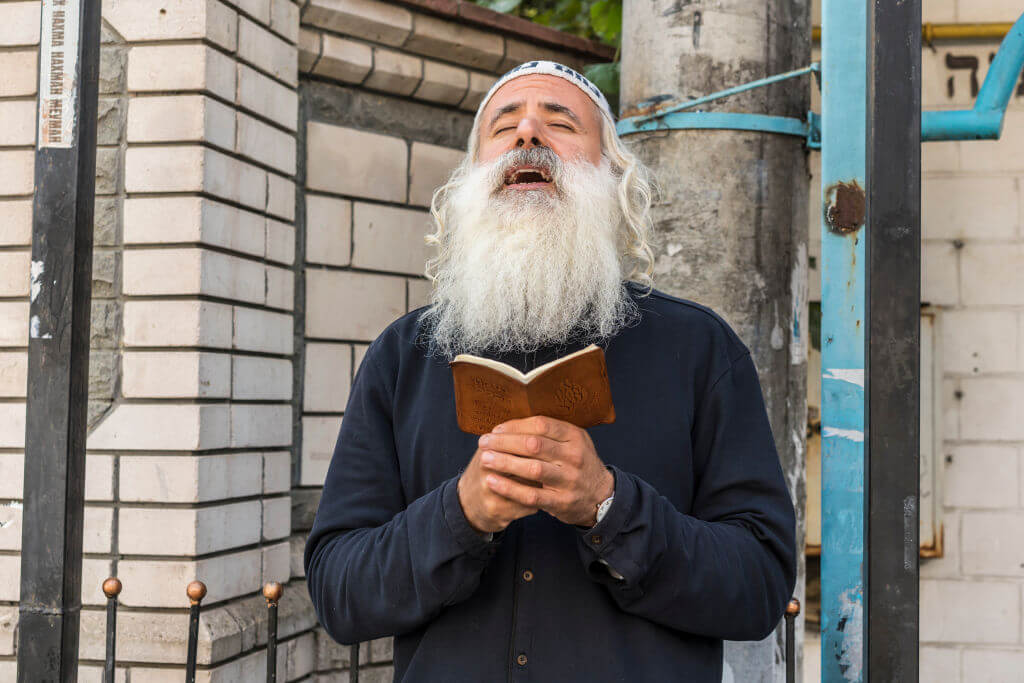Despite Ukrainian, Israeli warnings, Uman expects thousands of pilgrims on Jewish New Year
‘We expect people to come,’ local Jewish official says. ‘Not so many as every year, but anyway there are people who want to come’ despite the ongoing Russia-Ukraine war

Ronnen Amir, a Jewish pilgrim from Jerusalem, prays on September 18, 2020 in Uman, Ukraine. Photo by Getty Images
This article originally appeared on Haaretz, and was reprinted here with permission. Sign up here to get Haaretz’s free Daily Brief newsletter delivered to your inbox.
Despite an Israeli travel warning and Kyiv’s announcement that it is cancelling this year’s Rosh Hashanah pilgrimage to Uman, the central Ukrainian city’s small Jewish community says that it is still preparing for an influx of thousands of worshippers ahead of this year’s High Holidays.
“We expect people to come. Not so many as every year, but anyway there are people who [despite] the war want to come to Uman on Rosh Hashanah. We expect 8,000 to 15,000 people,” Irina Rybnitskaya of the Rabbi Nachman Foundation told Haaretz in a WhatsApp message from Uman on Tuesday.
“This is the approximate amount we were trying to estimate after we spoke with hotels and agencies,” she said.
The Israeli Foreign Ministry called on Israelis on Tuesday to avoid traveling to Uman in light of the ongoing fighting and the risk of Russian air attacks. Its statement came several weeks after Kyiv announced that it was cancelling the annual Jewish pilgrimage to Uman for security reasons.
“Imagine a crowd of 50,000 or even more praying in Uman and [the Russians] decide to shoot missiles. Can you guarantee that won’t happen after they were shelling shopping malls and kindergartens and schools,” Ambassador Yevgen Korniychuk asked in a statement posted to the Ukrainian embassy in Tel Aviv’s Facebook page in early July.
Tens of thousands of Orthodox Jews journey to the central Ukrainian town every year to celebrate the Rosh Hashanah holiday at the tomb of the early Hasidic leader Rabbi Nachman of Breslov, although there is a smaller permanent Jewish community there year-round.
But the city is now nearly empty of Jews, most of whom left after the Russians first started shelling the city. Following the Russian invasion in late February, the city’s Bratslav synagogue was transformed into a makeshift bomb shelter, with its underground ritual bath complex filling up with dozens of Ukrainians whenever an air raid siren sounded.
“The Ukrainian side is worrying that they cannot protect pilgrims from the possible attacks, and this is why they are making such statements,” Rybnitskaya said, explaining that despite “preparing as every year,” the local community was also taking steps to keep any pilgrims who do show up as safe as possible.
“We are preparing shelters, instructions [on] how to act, informing [sic] system. Medical care as always,” she said.
“We hope that this year everybody who comes will follow the rules and restrictions. War is always dangerous. But in our mind, we have to prepare conditions needed to those who anyway will decide to come.”
Asked how many worshippers may end up going to Ukraine despite efforts to curtail the pilgrimage, one Breslov rabbi involved in organizing the annual event told Haaretz that he had “no idea as of now” and that the situation was still “fluid.”
According to Mark Feldman, the CEO of the Jerusalem-based travel agency Ziontours, “with 2 months to go until Rosh Hashanah anything can happen.”
“No charter flights have been announced due to the war; if the situation changes they will be reinstated quite quickly. So for now, it’s not really a story as few of those that fly there plan so far in advance. Most wait until after [the summer fast of] Tisha B’av to make their plans.”
It is unclear how the Ukrainian authorities will respond if thousands of would-be pilgrims attempt to enter the country. Responding to the emerging pandemic, the annual pilgrimage was cancelled by Ukrainian authorities in 2020, although thousands of Hasidim still attempted to enter Ukraine anyway, with many of them ending up stuck at the border.
A message from our CEO & publisher Rachel Fishman Feddersen
I hope you appreciated this article. Before you go, I’d like to ask you to please support the Forward’s award-winning, nonprofit journalism during this critical time.
We’ve set a goal to raise $260,000 by December 31. That’s an ambitious goal, but one that will give us the resources we need to invest in the high quality news, opinion, analysis and cultural coverage that isn’t available anywhere else.
If you feel inspired to make an impact, now is the time to give something back. Join us as a member at your most generous level.
— Rachel Fishman Feddersen, Publisher and CEO